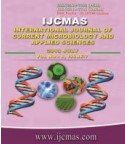


 National Academy of Agricultural Sciences (NAAS)
National Academy of Agricultural Sciences (NAAS)

|
PRINT ISSN : 2319-7692
Online ISSN : 2319-7706 Issues : 12 per year Publisher : Excellent Publishers Email : editorijcmas@gmail.com / submit@ijcmas.com Editor-in-chief: Dr.M.Prakash Index Copernicus ICV 2018: 95.39 NAAS RATING 2020: 5.38 |
Endophytes are microorganisms mostly bacteria and fungi that lives partially or completely its life cycle inside living plant tissue without causing adverse negative symptoms. Endophytes play a major role in structuring shaping processes of plant such as colonization, competition, coexistence and soil nutrient dynamics. Some endophytes promote growth of their host plants by enhancing the host’s ability to take up nitrogen and phosphorus. Recently endophytic fungi have gained importance in agriculture because of their ability to confer resistance to different abiotic stress conditions like temperature, cold, light intensity, drought, salinity etc., and biotic stress conditions like pathogen attack and insect herbivory by aiding several plant growth processes. Trichoderma can promote plant growth and also suppress the pathogen by producing numerous metabolites. They also induce systemic resistance against disease, they also bring about morphological adaptation which help in overcoming drought stress. Endophytic fungi Fusarium culmorum (FcRed1) found to have symbiotic relationship with rice seedlings under salinity and drought which in turn helps in increasing plant height, root length, biomass, higher osmolyte accumulation than the nonsymbiotic rice seedlings. Different fungal endophyte were known to confer thermo tolerance and produce different heat shock protein while living inside the plant and thereby helping the plants to sustain under conditions of both high and low temperature. This review will briefly summarize about plant-endophyte interaction and also its application in mitigating abioic stress in crop plants.
 |
 |
 |
 |
 |